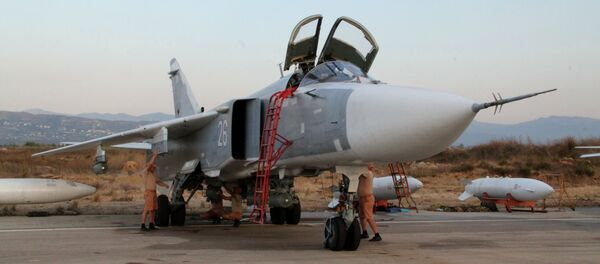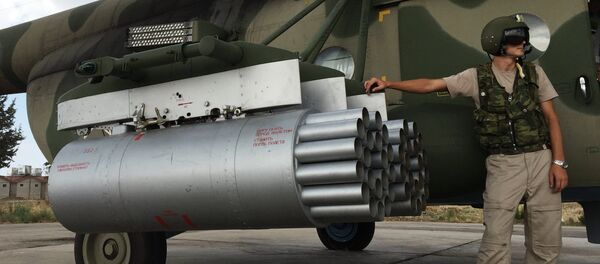Top secret Cabinet papers dating back to September 1957 reveal that the British government was quite uneasy of the possible consequences of the US policy of "regime change" in Syria. Moscow's reaction to the American policy on Syria, the British ministers observed, "could be expected to be strong and determined, and they [Moscow] would try to frustrate it by every means short of those which, in their judgement, would be likely to involve them in a war with the West."
The Red Line
Indeed, the Soviet leader Nikita Khrushchev protested the overthrow of the Syrian government by the West in the strongest possible way, and even hinted at a possible military action to defend Damascus. The British ministers' biggest worry, as the secret papers reveal, was that "the Russians might again threaten the United Kingdom with atomic missiles if they [UK] supported action against Syria."
A year earlier, such a threat did stop the British-French-Israeli aggression against Egypt over the nationalization of the Suez Canal, in its tracks. Syria, who supported Egypt in its quest for sovereignty, attracted unwelcome attention to herself.
Moscow drew the red line again and stuck to it. After some very dangerous posturing by Turkey and the United States, the crisis was eventually resoled.
So what was going on back in 1957 in the Middle East?
In August 1957, the Syrian military went into the office of the head of the country's intelligence service and betrayed a CIA plot to overthrow the government, surrendering the money they had received from the Americans. Tit for tat expulsions of US and Syrian diplomats followed, and instead of defusing the scandal, Washington went from a covert subversion into a highly public offensive, coercing Syria's neighbors and members of the Baghdad Pact, a Middle Eastern clone of NATO, into a war coalition against Damascus.
'Spirit of the West'
This was not the first attempt at "regime change" in Syria. The first, unsuccessful, plan to overthrow the Syrian Government was hatched as early as 1949. CIA's "Operation Straggle" in the fall of 1956, failed simply because of the Suez War in which Washington decided to play the "peacemaker" for its own geostrategic benefit. Ticking off Britain, France and Israel for their aggression against Egypt while attacking another Arab country would back Washington's claim of being the defender of freedom in the Middle East against both the Old World colonialism, and "communist encroachment".
Let alone the monarchies of Saudi Arabia, Iran, Iraq and Jordan were hardly representative of the "free world", Syria was nowhere near falling under the communist influence. Together with Egypt she was a champion of Arab nationalism and a founding member of the Non-Aligned Movement — and that's what did not suit Washington.
The goal of the American Middle East policy formulated by President Eisenhower was to "weaken objectively the intellectual appeal of neutralism and to predispose its adherents toward the spirit of the West."
To this end the US President ordered an intensive psychological warfare against Syria, which was staunchly neutralist. The aim was "to create a pro-US, anti-Soviet opinion climate" in which Syria could have been taken firmly into the western fold.
No wonder, the secret papers reveal British apprehension that such a campaign would only help to depict Syria "… as an innocent victim of a threatened aggression by the United States, United Kingdom and France, who were using reactionary Arab regimes to serve their imperialist aims of crushing Arab nationalism in the interests of oil companies and Israel." Soviet propagandists could not have put it better than the British ministers did!
'Stupidest Action'
And not only them: a US diplomat in Syria at the time, Deane Hinton, cabled to Washington:
"I want to go on record as saying that this is the stupidest, most irresponsible action a diplomatic mission like ours could get itself involved in, and that we've started a series of these things that will never end."
They do indeed continue to this day. What averted the turn to the worst back in 1957 was western understanding that Moscow was prepared to defend Syria's independence by all means.
The secret British memorandum of September 1957 lists options open to Moscow:
"(ii) The flow of weapons to Syria might be increased…
(iii) Soviet naval units might be moved into the Mediterranean…
(iv) Increasing numbers of "volunteers", especially technicians, advisers and specialists could be sent to Syria.
(vi) Soviet aircraft might be flown to Syria in force."
Back in 1957 western realization that Moscow was dead serious about defending Syria did knock diplomatic heads together and the crisis was defused by November that year. However, the plotting against the staunchly independent Syria never stopped, and before the "Free Syrian Army" there were "Free Syria Committees" set up by the same forces.
The release of the British Cabinet's secret assessment of Moscow-Damascus relationship could not be timelier. They show that this relationship goes back at least 60 years, and should be respected. There is now hope that this November may become the starting point for a political solution of the long-running Syria crisis.







